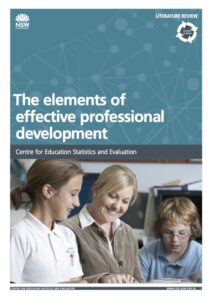
How effective are online PD courses for teachers?
With a healthy effect size of 0.54, PD is here to stay in schools. But how effective is PD when it is conducted online?
According to the NSW Department of Education, PD that has a positive impact on student outcomes has:
– A focus on the teachers’ content knowledge of the subject matter.
– A focus on the teacher’s knowledge of how students learn.
– Alignment to clear and specific contextual goals.
– Support from school leaders.

Interestingly, two prevalent elements of PD are yet to be deemed effective by the research (note this is academic speak which does keep the door open to them one day being deemed effective when someone does a study!):
a) There is no consensus on the appropriate number of contact hours or delivery timeframes for PD programs (cheeky information to keep in your back pocket the next time a PD provider says, ‘We need to do ten hours together to complete this course’).
b) This second one is going to be contentious. Unfortunately, there is little research to support the effectiveness of professional learning communities (but hey, if you find some, send it our way).
Based on this, can online PD be done effectively? Yes.
Does turning on EC Premium at your school solve your PD needs? Well, no, it won’t magically do that, but it can be a powerful part of your strategy. Here’s how:
- Flexibility and Accessibility: Online professional development allows teachers to access learning conveniently, eliminating the need for travel or time away from the classroom. Teachers can participate in courses, webinars, or discussions from anywhere with an internet connection. With Starlink and Airband beginning to bring fast internet to even the most remote regions, PD is being democratised rapidly in the 2020s.
- Customisation and Personalisation: Online PD platforms can offer a wide range of professional development options, allowing school leaders, heads of learning and teachers to choose topics and courses that align with the whole school strategy and meet their specific needs and interests. Rather than everyone being ushered into the indoor basketball court for an entire school development day, an online approach can be far more tailored.
- Collaboration and Networking: Online professional development often includes opportunities for teachers to connect and collaborate with colleagues from around the world, or at the very least, across their region or network of schools. During COVID, educators worldwide proved the effectiveness of discussion forums, virtual communities, and social media platforms to foster the exchange of ideas, sharing of resources, and building professional networks. Just look at the power of platforms like Teach Meet or Teachers Pay Teachers.
- Engaging and Interactive Learning: Well-designed online professional development programs utilise multimedia resources, interactive activities, and assessments to engage teachers in active learning. This approach can enhance the retention and application of knowledge and skills. On EC Premium, for example, we’ve just taken our first round of VR courses live, with one course, for example, helping educators around the world navigate difficult conversations.
- Continuous Learning and Progress Tracking: Online platforms can provide teachers with ongoing access to resources, allowing for continuous learning and growth. Additionally, many platforms offer progress-tracking features, enabling teachers and administrators to monitor and evaluate professional development outcomes. So, when you are thinking about who to tap on the shoulder for that next leadership role, a glance at the professional development efforts of your team can be one more way that you can help build your shortlist.
- Cost-effectiveness: Online professional development often reduces costs associated with traditional in-person training, such as travel expenses, venue rentals, printed materials, the chicken or the salmon at the conference and yes, even the cover band who will run through the Grease medley. This can make professional development more accessible to a more significant number of teachers and school districts. (Don’t get us wrong, we love a good conference dinner as much as anyone!).
Saying all this, bad PD is bad PD, whether it’s in a physical room or done online. Our learning design team are hard at work every day to ensure that our content providers are providing the best learning possible. And as always, if you have feedback on how we can improve, please get in touch at ec@go1.com.




